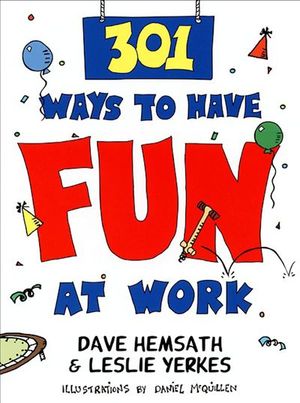301 Ways to Have Fun At Work
Leslie Yerkes Follow this author
Follow this author
Published by Berrett-Koehler Publishers
The most successful organizations add a healthy dose of play into their daily or weekly routines. In fact, research has shown that when people actually enjoy their jobs they're more creative, more productive, and more committed to doing their jobs well. Companies like the Colorado Health Sciences Center and Southwest Airlines attest to the positive effect of fun at work. Both trace increased job satisfaction and decreased employee downtime to concerted efforts to make fun a part of their corporate identity. With 301 Ways to Have Fun at Work , Dave Hemsath and Leslie Yerkes offer a complete resource anyone can use to create a dynamic workplace that encourages and inspires fun-and-games camaraderie among employees. It combines thorough research with practical hands-on tools, and features hundreds of ideas real companies have used to lighten up the workplace. The authors surveyed over 1,500 individuals from organizations around the world and received enthusiastic responses that yielded a broad range of ways to spice up the work day. The suggestions in 301 Ways to Have Fun at Work include humorous training films, dress-up and dress-down days, silly job titles, awards for people who go "above and beyond the call of duty" when a coworker is on vacation, "ritual dances" at the completion of a project, a fashion show when it's time to choose a new uniform-even foam dart fights after meetings. Hemsath and Yerkes offer ideas for instilling an element of fun into various business functions-from office environment, to meetings, training, communication, hiring, recognition, team building, and "simple acts of fun." In addition to the fun ideas in these chapters, a series of side bars, called "fun facts," "fun quotes," and "fun resources" offer humorous and interesting facts and statements about the effects of fun on workplace performance and job satisfaction, and direct readers to useful sources for products and services to enhance workplace "funativity." Hemsath and Yerkes show that creating a fun atmosphere in the workplace increases productivity and morale and has a positive effect on the bottom line. Most importantly, they give readers the tools to have more fun at work, no matter where they work, or what position they're in.
BUY NOW FROM
COMMUNITY REVIEWS

